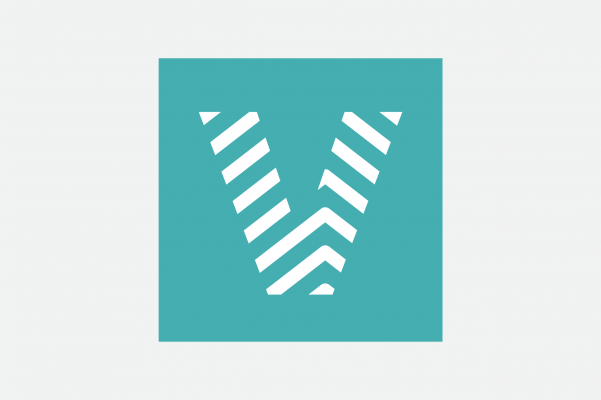
The Vertically Integrated Project (VIP) brings together students from different sectors, allowing them to develop a large-scale design and research project while strengthening and expanding the scientific activities of the academic staff. The aim of the study course is to make it possible for students from different study programmes and levels to cooperate in a long-term research project – Master’s and Doctoral students supervise the work of ̄Bachelor’s students at a design and research project, which may be a part of the research work of the respective Master’s or Doctoral student.
Students earn credit points, and the academic staff can use the team work results. Teams are interdisciplinary – students from all faculties are involved and vertically integrated – each semester, students represent different levels of study, ranging from Bachelor's to Doctoral studies. All students at Bachelor's, Master’s, and Doctoral level may participate in the project for 2 semesters. The work of the team is supervised by a professor and is managed by senior students. The team should work continuously on developing the prototype and collecting and processing data by applying the research method. Quality control and assistance in design and prototype manufacturing are provided by the RTU Science and Innovation Center.
Team Goal:
Team Tasks:
Extra opportunity:
Extra focus on enhancing system performance and carrying out airflow simulations of the developed system using fluid and gas flow modeling software.
Opportunity to participate in one of the industry's leading conferences (ROOMVENT 2024, BuildSim, etc.) or get internship possibility at university.
Looking for:
Curious students in the field of robotic, 3D scanning and indoor air quality.
Supervisor:
Prof. Anatolijs Borodiņecs (RTU)
Prof. Žanna Martinsone (RSU)
Over numerous semesters Team «Bioenergy» has collected data on food waste composting and developed several prototypes, including the development of the brand «Kurbads EKO». The Team regularly participates in competitions and actively works in the laboratory. Those who do not want to get their hands dirty always have the chance to link food waste with electronics and process control systems.
Team Tasks:
This semester the students will have the opportunity to work on data processing and scientific writing. We aim to transfer the collected data into a scientific publication and present the results in an international conference as part of the deliverable for this VIP semester.
Looking for:
students interested in improving their scientific writing and data processing skills. If you are ready to read, write and analyse biological data, you will be highly welcome. Do not be scared if, biology is not your topic of interest – we have huge amount of numbers that want to be processed and made into nice graphs
Supervisor:
Asoc. Prof. Linda Mezule
Team Goal
Past two semesters we were developing our energy efficient electric tricycle to participate in races and compete in engineering skills with other students’ teams. We have designed and built our racing tricycle fully by ourselves beginning with an aluminum frame and ending with a multi-functional steering wheel. In June 2023 we participated and helped organize first in Baltics efficiency race. Our big goal remains participation in a world-wide energy efficiency competition «Shell Eco-marathon».
Tasks
Looking for
Students, who are familiar with electrical and mechanical engineering or applied programming, value experience in the field before and desire to improve skills even more. People who are active, interested in the topic and are able to work independently have priority.
Supervisor:
Prof. Janis Zakis
Team Goal:
Research and development of an autonomous robotics system
1. Sub-goal 1: Research and development of autonomous self-organizing robotic railway system model
2. Sub-goal 2: Research and development of computer-vision-based harvesting robot subsystems
Team Tasks:
Extra opportunity:
Publishing of scientific papers that give opportunity for further, especially in doctoral, studies
Looking for:
Science-oriented students with both creative thinking and programming skills in C++, Python, and controllers. Experience in computer vision programming is a great advantage.
Supervisor:
Professor Dr. sc. ing. Mihails Gorobecs
Team Goal:
Develop an AI algorithm for more efficient building management by predicting changes in the building's interior state and timely adjustment of control parameters.
Team Tasks:
Extra opportunity:
Students can use the project to simplify the writing of their thesis, having previously coordinated the topic with their supervisor.
Involvement in the project provides students with the opportunity to contribute to scientific papers, which can be a plus during thesis defense.
Competent individuals have the opportunity to secure paid positions in scientific projects.
Looking for:
The team is inviting students with knowledge in microcontroller programming (C++, Python), GUI development, artificial neural networks, image processing, and 3D printing.
Supervisor:
Jevgenijs Teliko
Team Goal:
Represent Riga Technical University through the development of technologically complex projects, such as high-power rockets and stratospheric balloons, and achieve records or participate in competitions.
Team Tasks:
Extra opportunity:
Looking for:
We're looking for students interested in rocketry and the space industry overall, with diverse skills ranging from marketing, sponsorship acquisition, social media management to electronics, programming, and mechanical engineering.
Supervisor:
Andrejs Puķītis
Team Goal:
Design and construct a system for biobased wastewater treatment and resource recovery.
Team Tasks:
Extra opportunity:
Looking for:
Highly motivated students with backgrounds in biology, chemistry, electrical engineering, business, industrial design.
Supervisor:
Prof. Tālis Juhna and Aigars Lavrinovičs
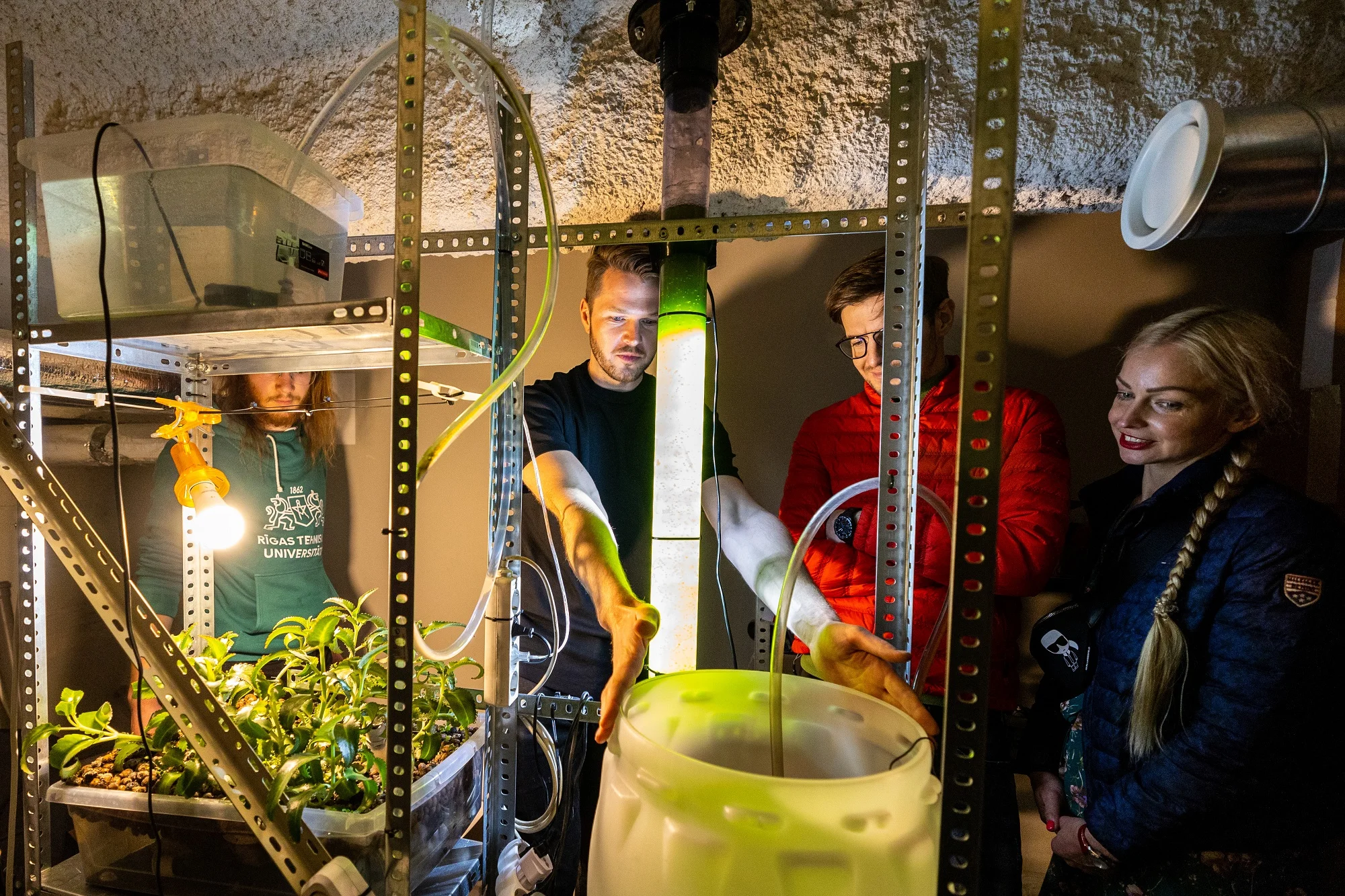 The team aims to build and demonstrate a sustainable and circular solution for wastewater treatment and air quality improvement for use in households, small industries, urban spaces, and isolated environments (e.g., space stations). The main tasks of the team are to upgrade the existing pilot-scale system based in bioproceses by an aquatic food web, improving its biological performance and process automation; develop advanced performance monitoring system; implement the use of real wastewater in the pilot system, and do a cost-benefit and energy balance analysis of the pilot systems.
The team aims to build and demonstrate a sustainable and circular solution for wastewater treatment and air quality improvement for use in households, small industries, urban spaces, and isolated environments (e.g., space stations). The main tasks of the team are to upgrade the existing pilot-scale system based in bioproceses by an aquatic food web, improving its biological performance and process automation; develop advanced performance monitoring system; implement the use of real wastewater in the pilot system, and do a cost-benefit and energy balance analysis of the pilot systems.
Every semester the team is looking for passionate and self-motivated students with practical skills and knowledge in biology, chemistry, electronics, automation, industrial design and economics.
Supervisor Prof. Talis Juhna with assistant Aigars Lavrinovics
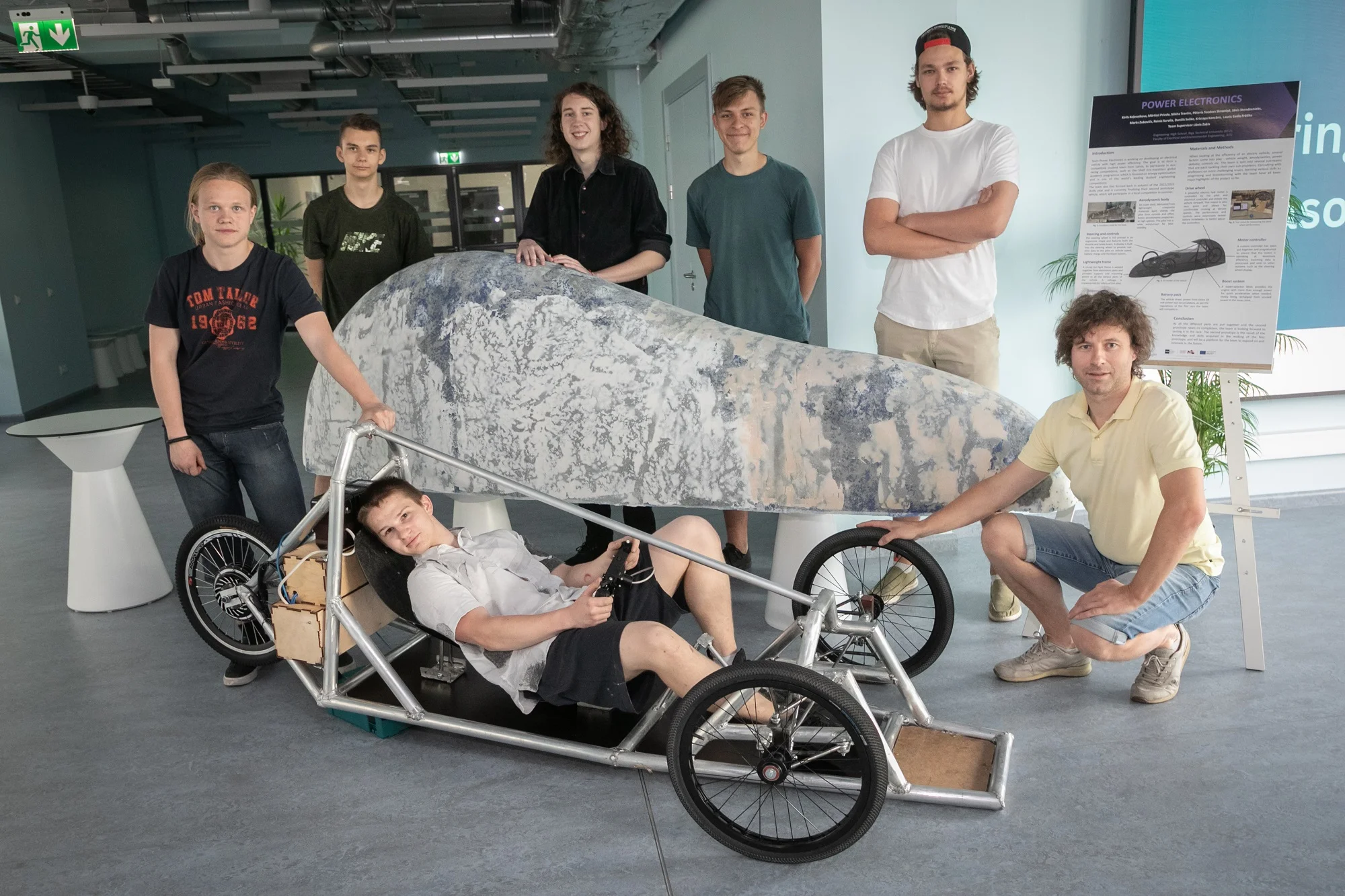 For the last two semesters, the team developed an energy-efficient electric vehicle (tricycle) to race and compete against teams of other engineering students. The team members designed and built their own racing trike, starting with the aluminum frame, electric drive system and ending with the multi-functional steering wheel. In June 2023, the team participated in the first energy efficiency competition in the Baltics. The main goal of the team is participation in the global energy efficiency competition «Shell Eco-marathon».
For the last two semesters, the team developed an energy-efficient electric vehicle (tricycle) to race and compete against teams of other engineering students. The team members designed and built their own racing trike, starting with the aluminum frame, electric drive system and ending with the multi-functional steering wheel. In June 2023, the team participated in the first energy efficiency competition in the Baltics. The main goal of the team is participation in the global energy efficiency competition «Shell Eco-marathon».
We invite students who have knowledge in the fields of electrical engineering or mechanical engineering and IT to join our group. We greatly appreciate previous experience in these areas as well as high motivation and desire to self-development.
Supervisor: Assoc. Prof. Janis Zakis
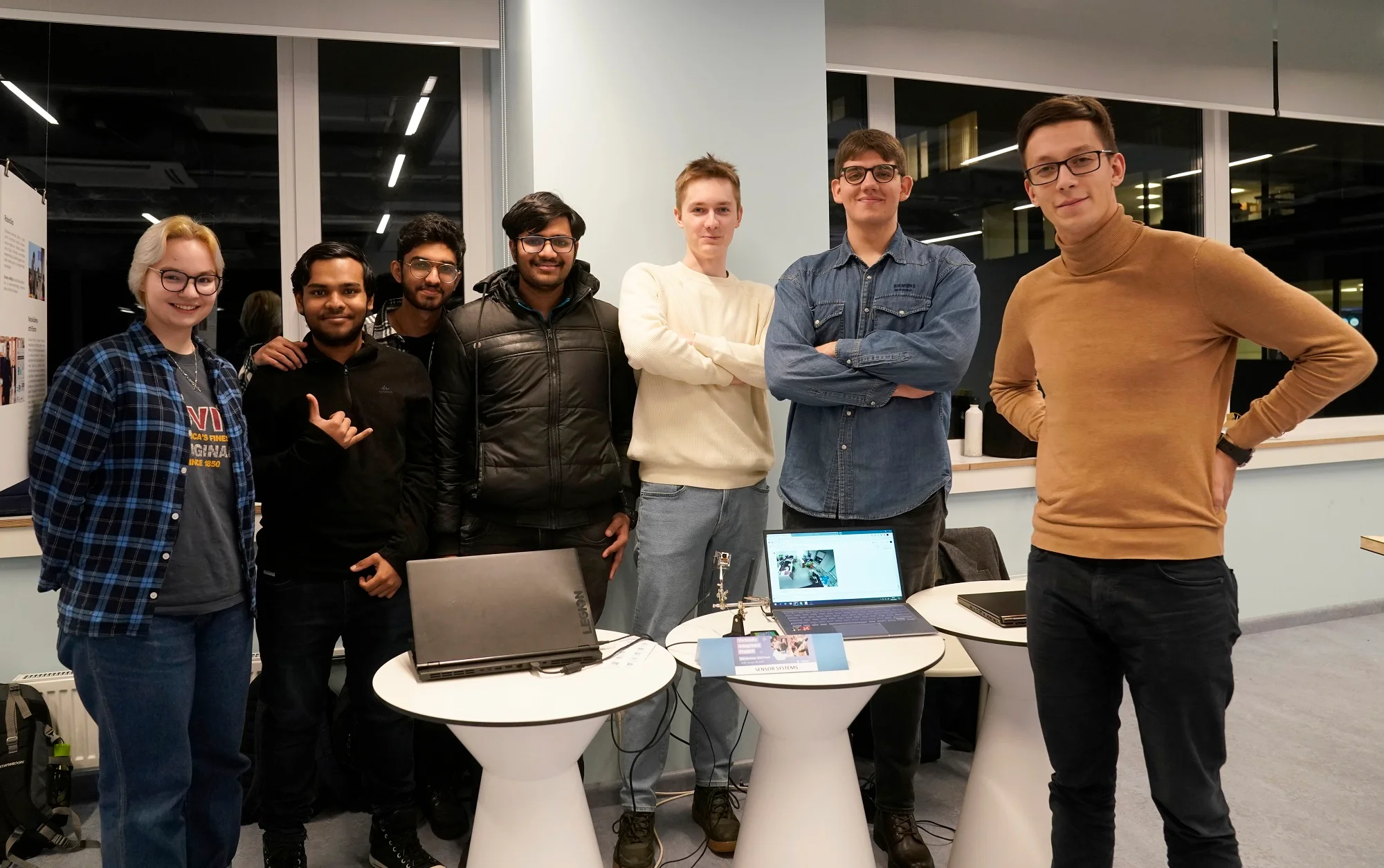 This semester, the sensor team will continue the development of a monitoring system for intelligent monitoring and control of buildings. The system employs various smart sensors, including self-developed cameras, in conjunction with artificial intelligence algorithms for people counting and other sensor functionalities, to assess building behavior. Data set augmentation techniques can be utilized to attain flexible and highly accurate AI models.
This semester, the sensor team will continue the development of a monitoring system for intelligent monitoring and control of buildings. The system employs various smart sensors, including self-developed cameras, in conjunction with artificial intelligence algorithms for people counting and other sensor functionalities, to assess building behavior. Data set augmentation techniques can be utilized to attain flexible and highly accurate AI models.
As the sensors are distributed in different locations, establishing secure communication among all system modules is crucial. To ensure user-friendly interaction, the system incorporates a mobile app based on a Telegram bot for system debugging and future development. All data is stored in a versatile database. However, considering the limited computing power of the small MCUs in the sensors, it is necessary to implement a central computing module to effectively support the AI models. In order to enhance building energy performance, it is important to develop and test several models.
The team is looking for students with knowledge of microcontroller programming C++, Python, GUI development, AI neural networks, image processing and 3D printing.
Supervisor: Prof. Jurgis Porins with assistant Jevgenijs Telicko
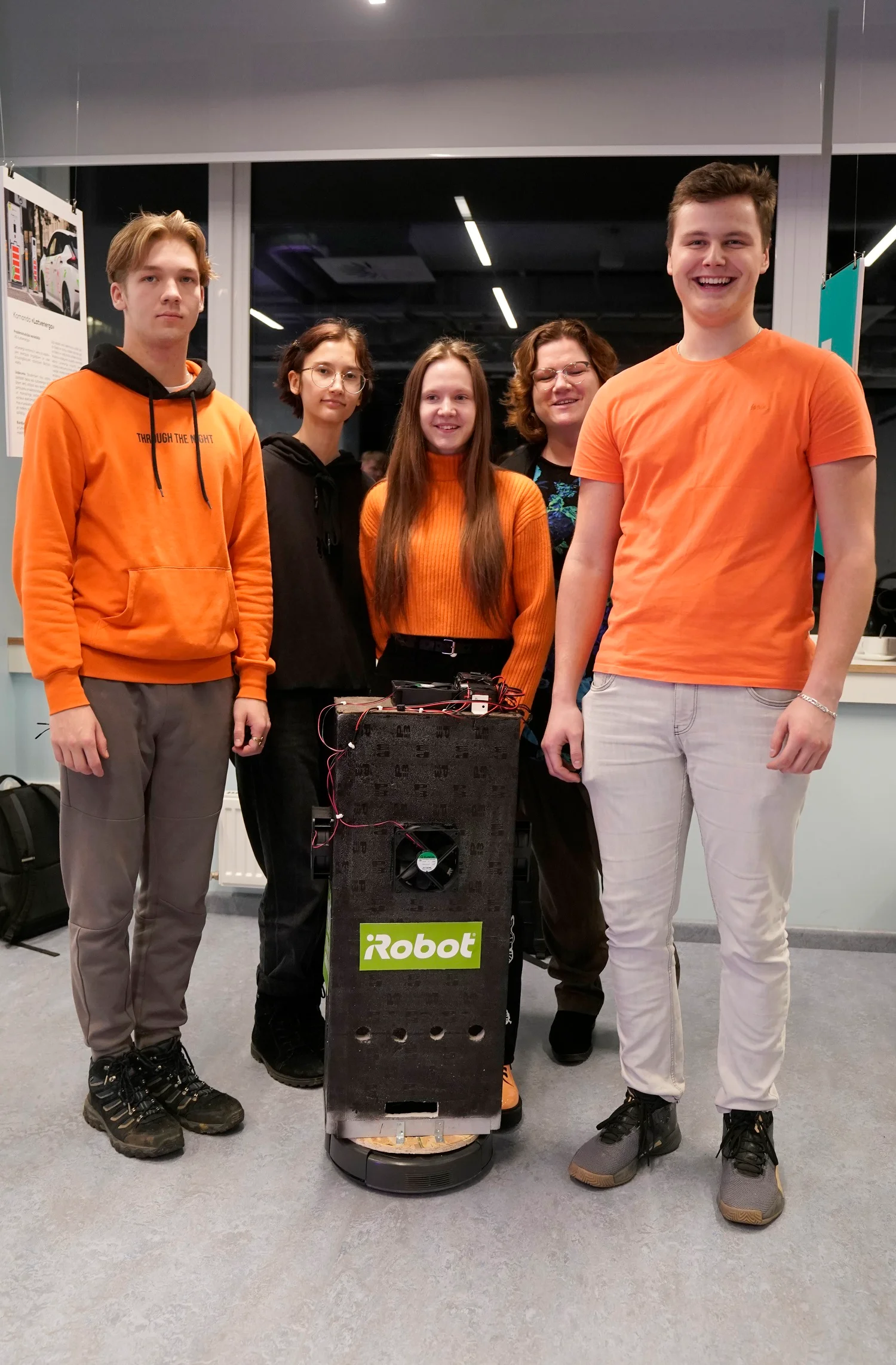 The team’s goal is to create smart and efficient Indoor Air Tracker for selective air purifying and disinfection. The tasks include creating a prototype as a mobile air purification robot to achieve good indoor air quality, integrating also UV-C, and to conduct a study dedicated to physical, chemical, and biological aspects of indoor air in experimetal premises.
The team’s goal is to create smart and efficient Indoor Air Tracker for selective air purifying and disinfection. The tasks include creating a prototype as a mobile air purification robot to achieve good indoor air quality, integrating also UV-C, and to conduct a study dedicated to physical, chemical, and biological aspects of indoor air in experimetal premises.
The team is looking for: active, creative, self-organised and enterprising students, who are ready to deal with technical (e.g., sketch preparing, detail assembly, sensor communication), electronics, robotics and IT solutions (sensors communication, premise scanning, persons’ counting in premises etc. challenges).
In cooperation with Riga Stradins University
Supervisor: Prof. AnatolijsBorodiņecs (RTU) and Assist. Prof. Zanna Martinsone (RSU)
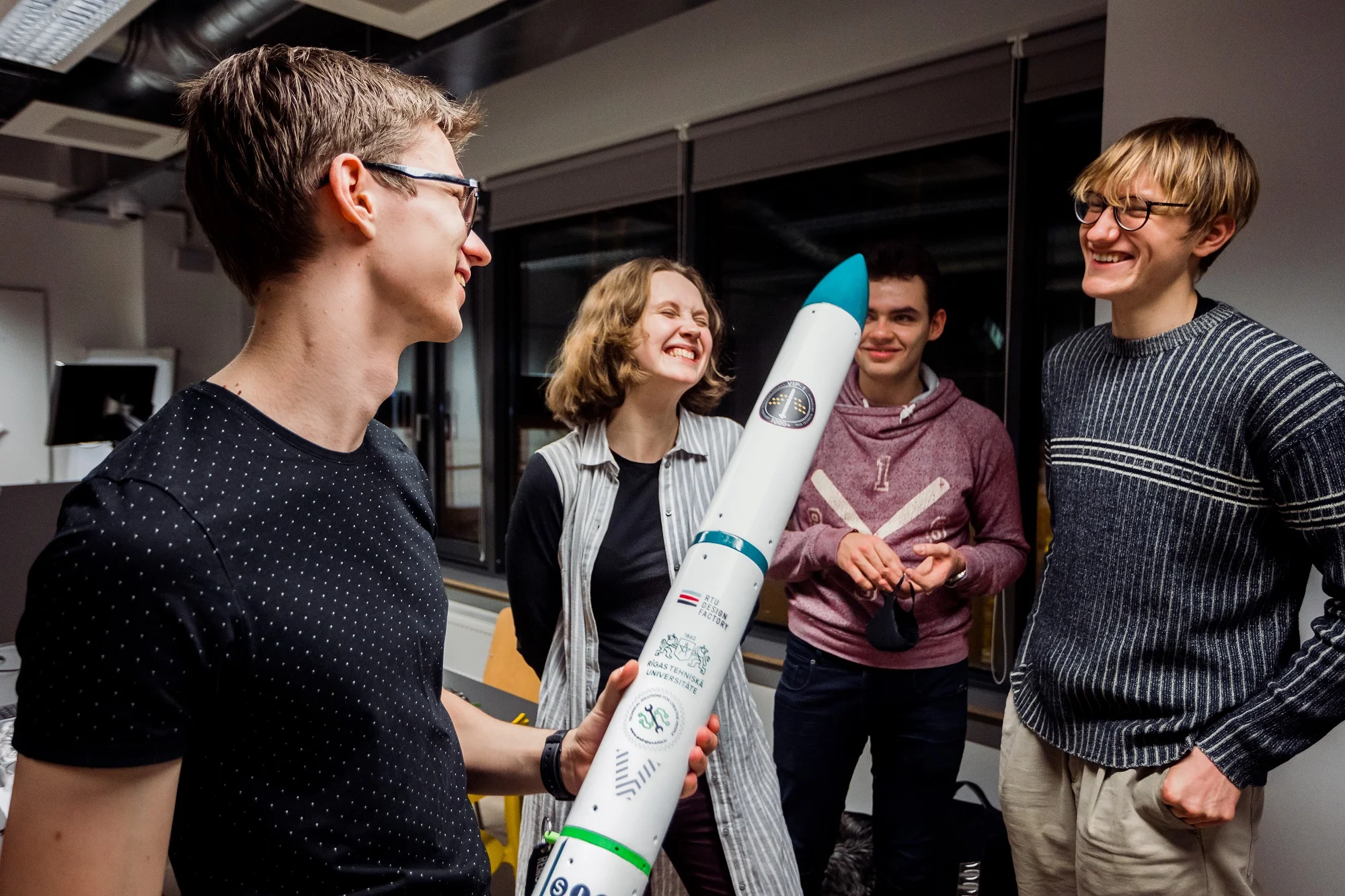 Over the past 2 years, Team has been developing the first high powered student-built rocket in the Baltics, which was first tested in December 2021, with the updated version launched in July 2022. It has its own flight computer, which not only logs data, but also communicates via radio with ground stations and deploys a parachute using our custom-built deployment mechanism. In addition to that, the airframe and all internal components have been painstakingly designed to undergo extreme acceleration and high aerodynamic loads. During the flight, the rocket reaches speeds up to 800 km/h and an altitude of more than 1 kilometer.
Over the past 2 years, Team has been developing the first high powered student-built rocket in the Baltics, which was first tested in December 2021, with the updated version launched in July 2022. It has its own flight computer, which not only logs data, but also communicates via radio with ground stations and deploys a parachute using our custom-built deployment mechanism. In addition to that, the airframe and all internal components have been painstakingly designed to undergo extreme acceleration and high aerodynamic loads. During the flight, the rocket reaches speeds up to 800 km/h and an altitude of more than 1 kilometer.
For the new semester, the main research objective is to create a solid experimental basis and gather reliable data and predictions for successfully executing a rocket launch from a platform which is transported to a height of 20-25 km by a stratosphere balloon. To accomplish that we have to build and experimentally test the following systems: long-distance two-way communications with the balloon platform, stabilisation and pointing of the platform in the roll axis, gain flight heritage for our systems in the stratospheric environment, organisation, planning and execution of HAB flights, practiced recovery of the balloon platform.
The team is looking for hard-working students possessing knowledge in electronics, programming or mechanical engineering with a passion for space exploration and rocketry. Additionally looking for business and/or marketing students who are interested in commercialization of rocket technologies.
Supervisor: Pauls Irbins with assistant Andrejs Pukitis
Contact information: m
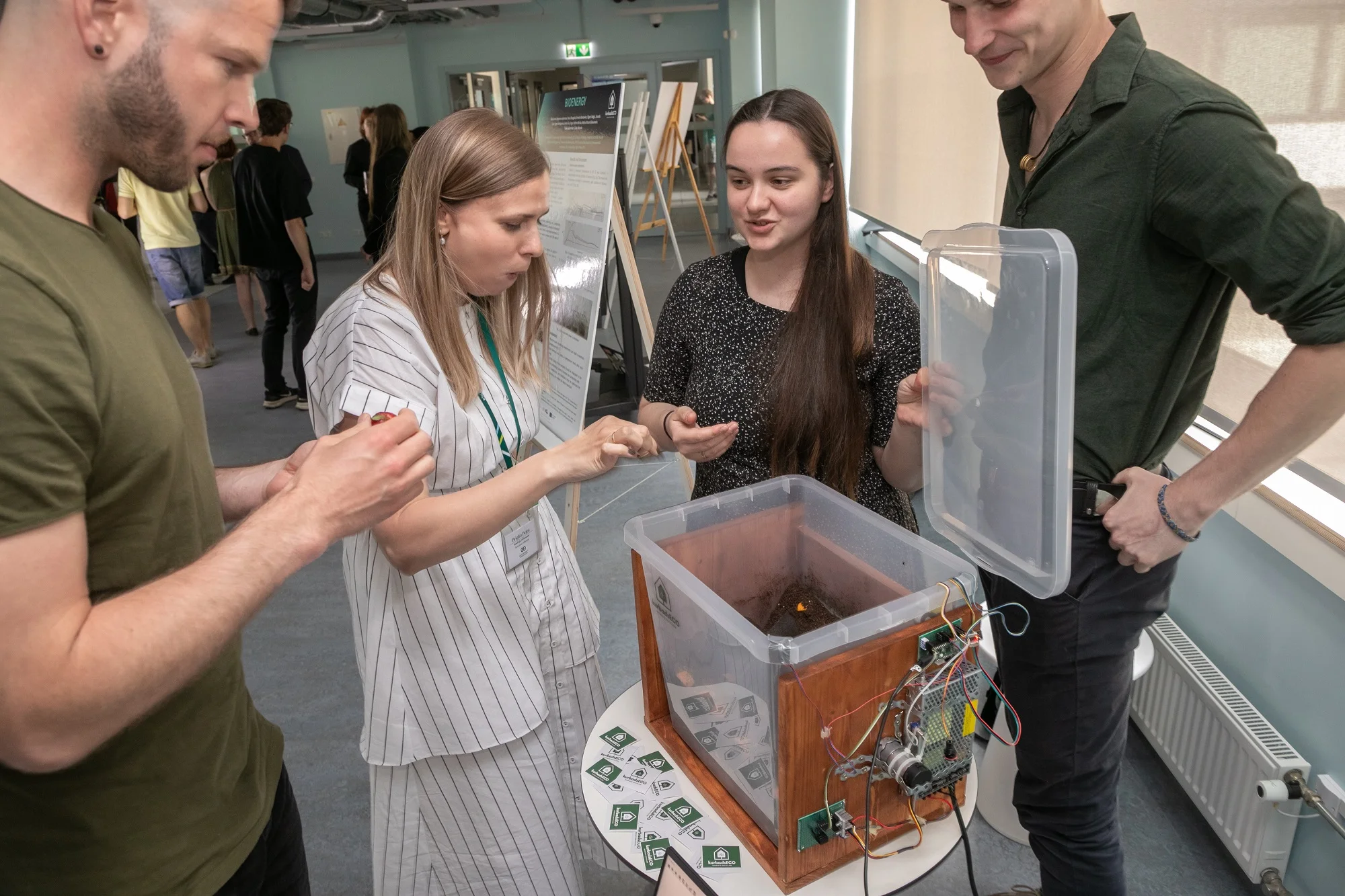 Team Bioenergy is working on technology and prototype development for food waste composting. Technical design, practical assembly, development of sensors for monitoring, selection of microorganisms to reduce odors and enhance the composting are only some of the activities done by the team «Bioenergy». Team prototype «Kurbads» has been recognized in Inno-Eut+ project by winning 2nd place in student idea competition in Fall semester 2021, the team participated in RTU SIG Demo day in spring 2022 and Origo exhibition in summer 2022.
Team Bioenergy is working on technology and prototype development for food waste composting. Technical design, practical assembly, development of sensors for monitoring, selection of microorganisms to reduce odors and enhance the composting are only some of the activities done by the team «Bioenergy». Team prototype «Kurbads» has been recognized in Inno-Eut+ project by winning 2nd place in student idea competition in Fall semester 2021, the team participated in RTU SIG Demo day in spring 2022 and Origo exhibition in summer 2022.
The team is looking for new enthusiastic students who are interested in practical work in the laboratory and process design. Students experienced in chemical technologies, economics and machine building are especially welcome.
Supervisor: Prof. Linda Mezule
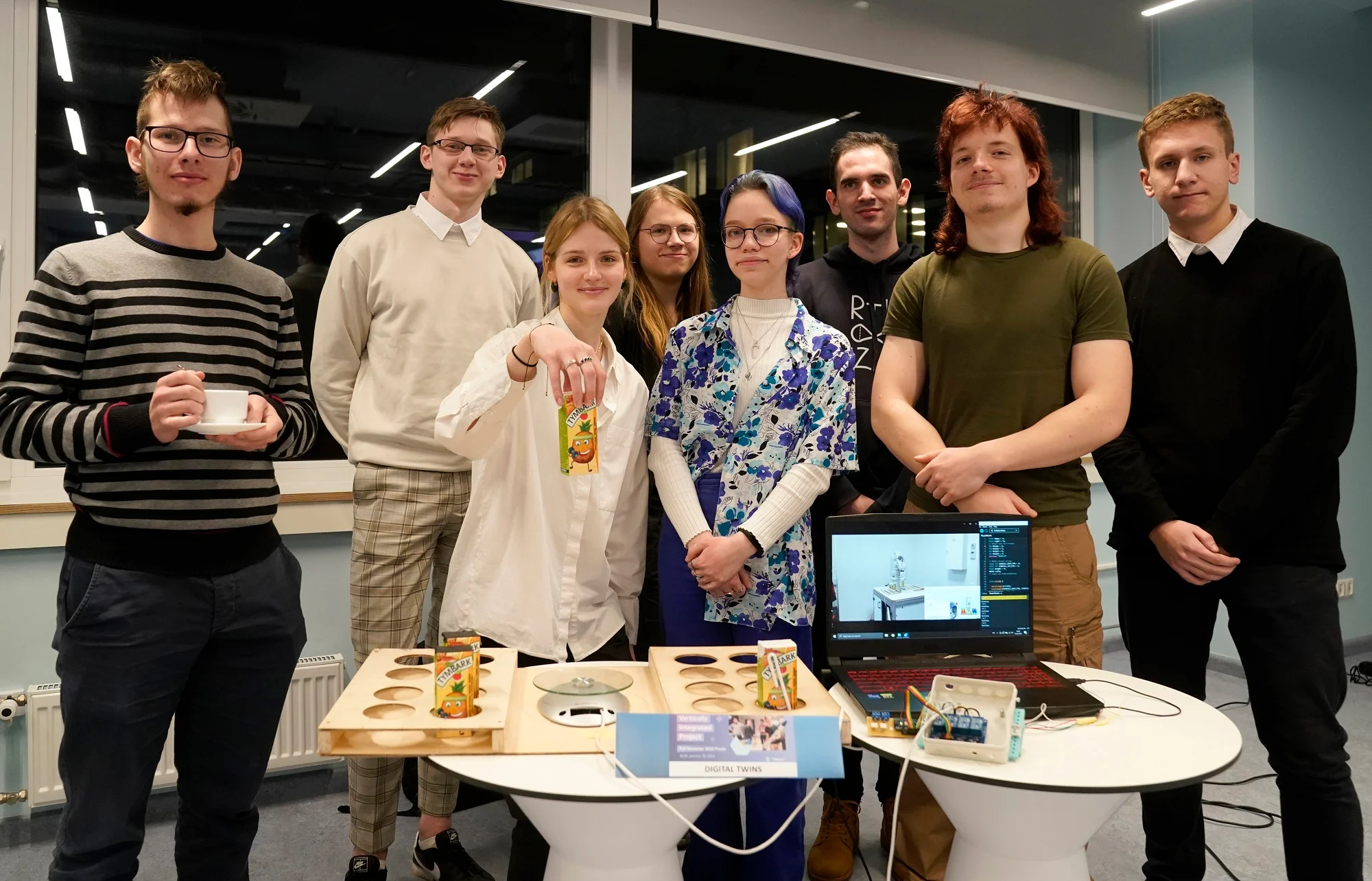 Modelling and controlling a manufacturing process using Digital Twin concept focusing on design of a conveyor-based assembly line`s physical and virtual model and establishing a bi-directional data flow.
Modelling and controlling a manufacturing process using Digital Twin concept focusing on design of a conveyor-based assembly line`s physical and virtual model and establishing a bi-directional data flow.
Team tasks include building the physical model that involves programming a robotic arm manipulator/ -s as well as setting up different sensors (positioning, item weight, video stream, quality control, etc.) and configuration of central control panel using NodeRed and MQTT communication protocol. The other part is designing a digital twin being a virtual representation that serves as the real-time digital counterpart of a physical object or process. This task involves creating a 3D simulation model that supports data exchange with physical model. The overall goal is to collect the relevant data to be used for further predictive analytics of the whole manufacturing process.
Team is looking for students with programming skills (Python, Matlab, C/C++, ROS – desirable, but not mandatory) as well as any experience in data visualization/analysis and IP network gateways configuration is welcomed in the Digital Twins team to learn and experience the future opportunities of manufacturing processes.
Supervisor: Prof. Jurgis Porins with assistant Matiss Erins and Andis Supe
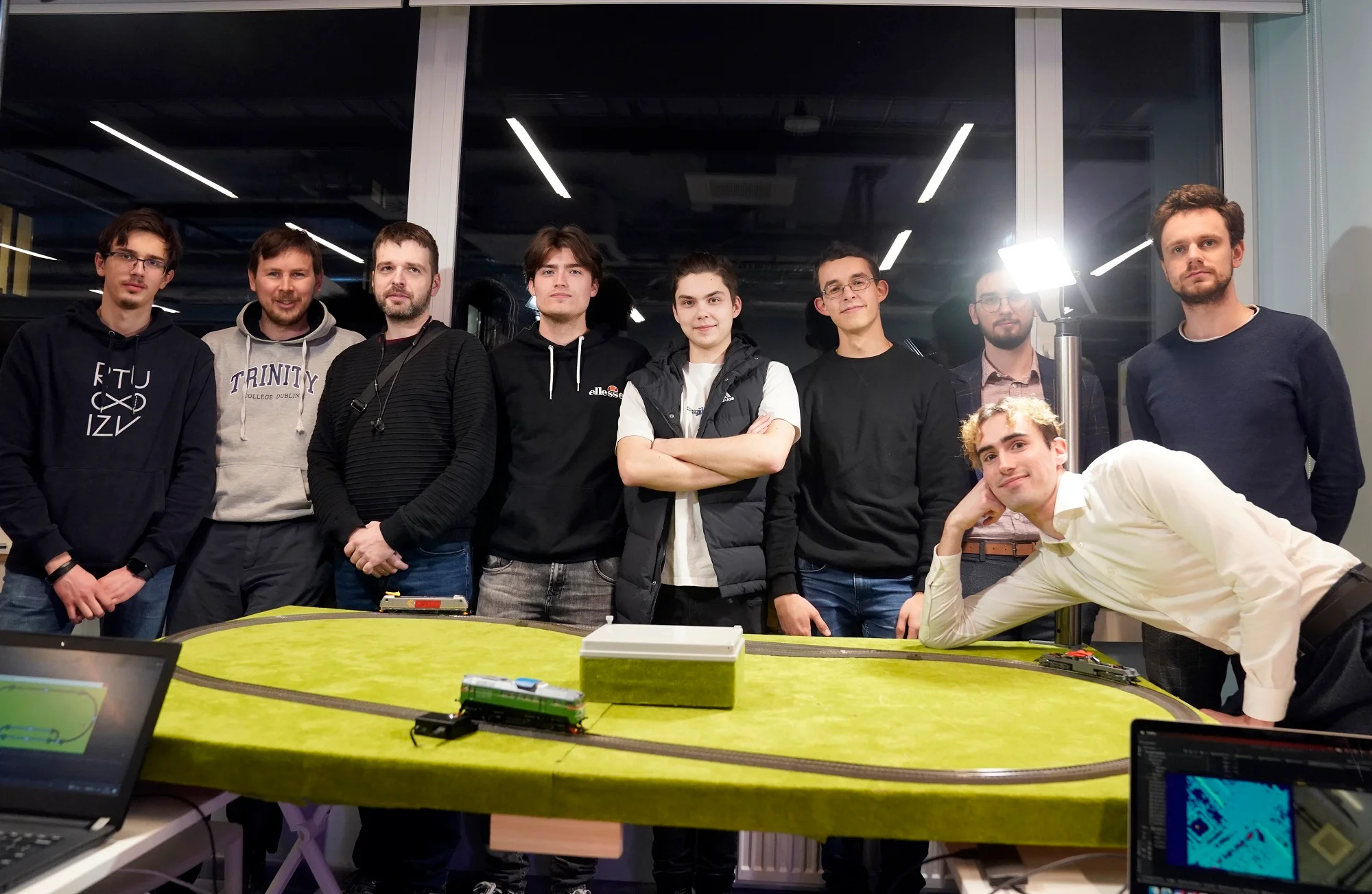 The team is working on researching and developing prototypes for robotized unmanned electrical vehicles. Initiation of Rail Baltica construction stimulated the research and development of future railway technologies such as autonomous train operations (ATO).
The team is working on researching and developing prototypes for robotized unmanned electrical vehicles. Initiation of Rail Baltica construction stimulated the research and development of future railway technologies such as autonomous train operations (ATO).
The primary task of the Robotics group is to develop and implement intelligent control algorithms for microcontroller based railway model prototypes to test and evaluate the functionality of ATO with Grade of Automation Level 4. The work is organized in small R&D groups of students to develop different functional components of the complex autonomous robotic trains: traction control, train positioning and identification, wireless data transmission, computer vision based recognition, telemetry including on-board and trackside devices as well as visualization, scheduling centralized and decentralized functions etc.
The team is looking for students with knowledge and skills of software development such as microcontroller programming in Python/C++ for Raspberry Pi, ESP32, client-server technologies, wireless technology, computer vision or hardware development, such as PCB design, soldering etc.
Supervisor: Prof. Mihails Gorobecs
Contact information: +371 67089880
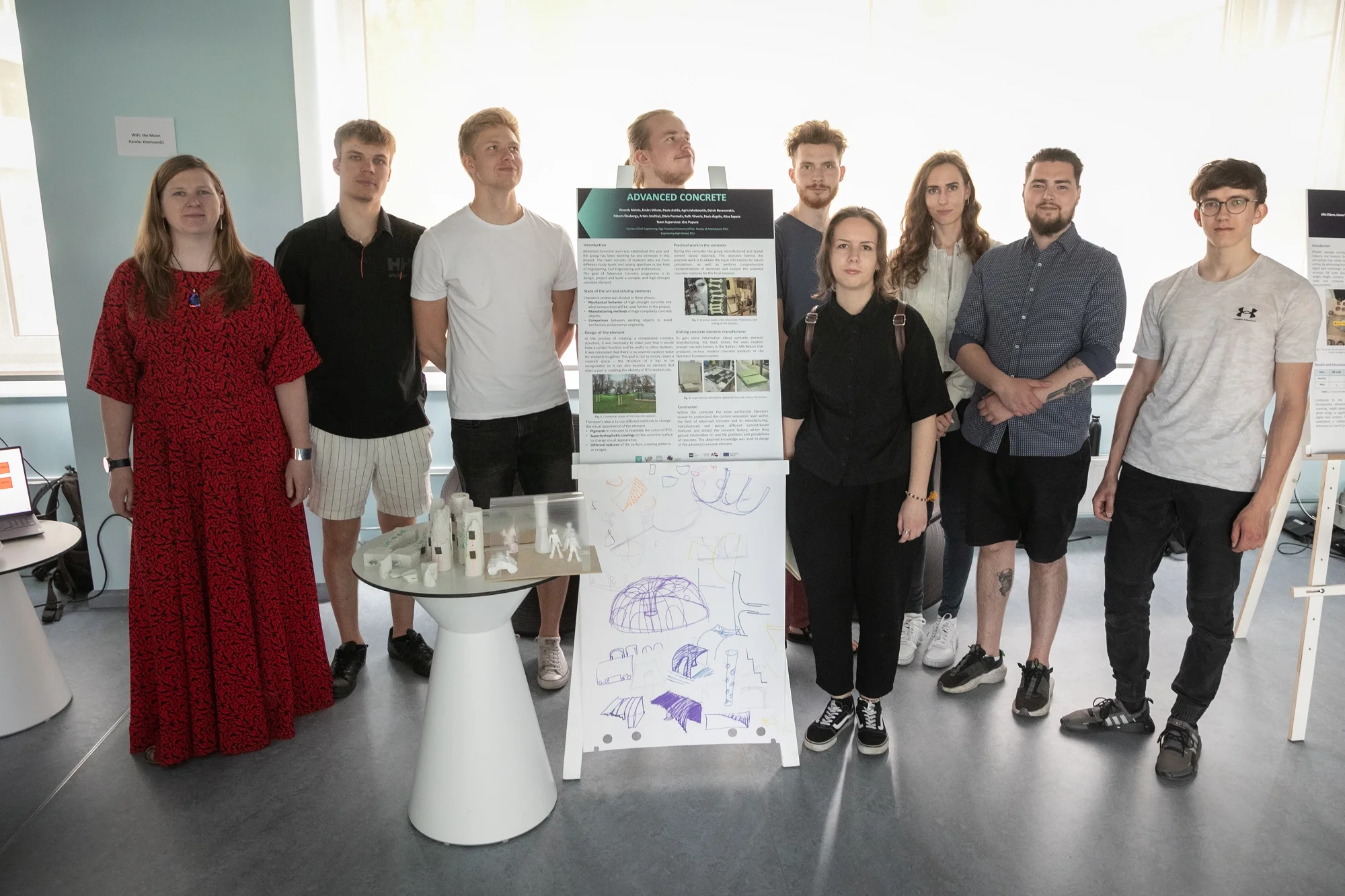 Team’s current goal is to design a novel, structurally complex high-strength concrete element with innovative framework technology. Tasks include to analyze the mechanical behavior of high-strength concrete for use in advanced civil-engineering elements and develop and test the methodology of a flexible framework of glass fiber residue.
Team’s current goal is to design a novel, structurally complex high-strength concrete element with innovative framework technology. Tasks include to analyze the mechanical behavior of high-strength concrete for use in advanced civil-engineering elements and develop and test the methodology of a flexible framework of glass fiber residue.